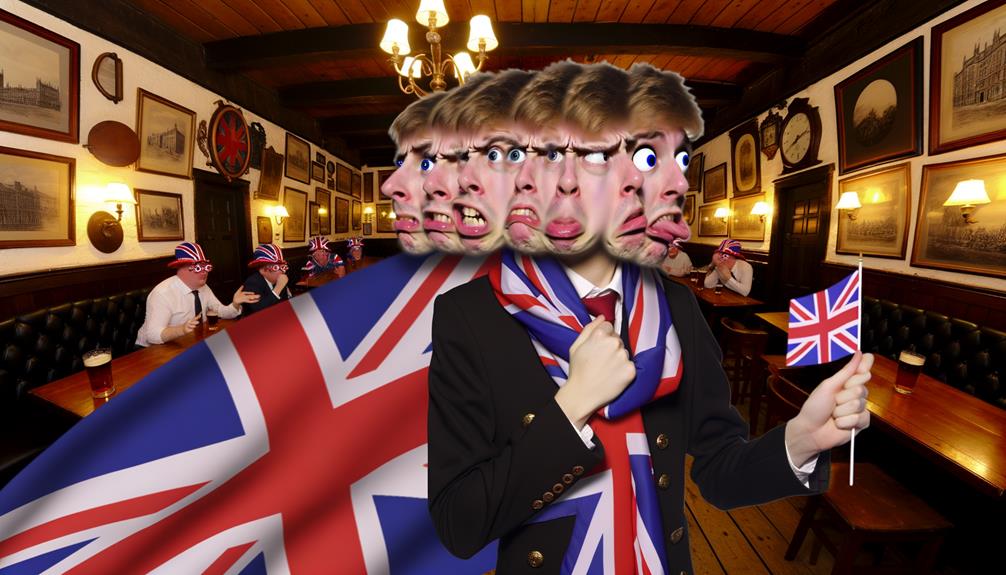Ah, 'plonker,' a term you've probably stumbled upon while exploring the vibrant world of British slang. Originally sprouting from the verb 'to plonk', this playful insult has danced its way through generations, becoming a beloved emblem of British humor and affection. Traditionally, calling someone a plonker is akin to pointing out their foolishness, but always with a wink and a nudge. It's peppered across conversations among friends, serving as a humorous reminder not to take life too seriously. Thanks to shows like 'Only Fools and Horses', its usage is both iconic and endearing. Stick around, and you'll uncover even more about this fascinating word's journey.
Key Takeaways
- 'Plonker' is a term of British origin, commonly used to describe someone acting foolishly or incompetently.
- The word has its roots in the verb 'to plonk', evolving over time to become affectionate slang.
- It's often used playfully among friends or family, reflecting a sense of camaraderie and affection.
- Popularized by the sitcom 'Only Fools and Horses', where it's used to highlight affectionate banter between characters.
- While deeply embedded in British culture, 'plonker' may not be well understood outside the UK, showcasing the unique charm of British slang.
Origins of 'Plonker'
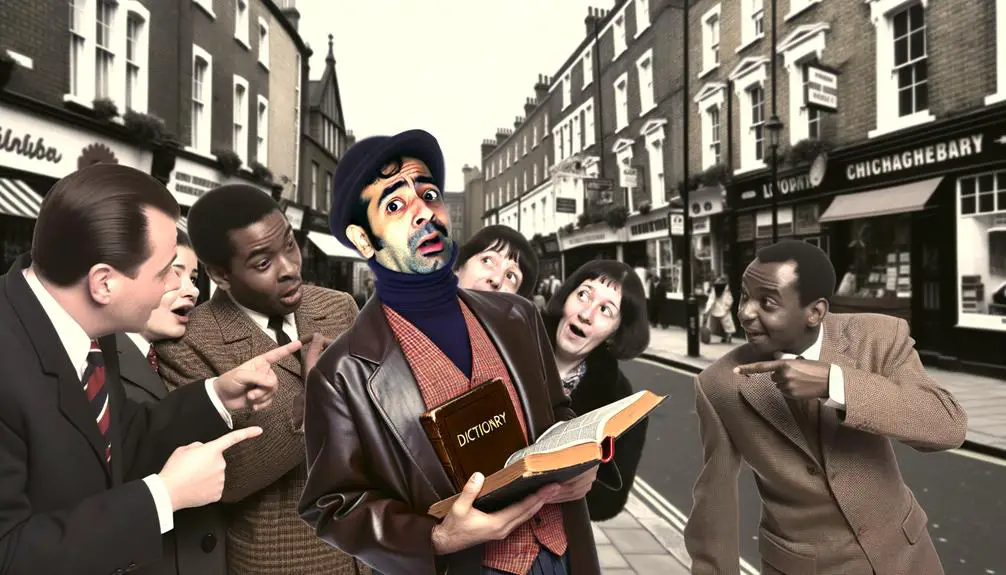
Delving into the origins of 'plonker,' you'll find it's a term steeped in British culture, evolving from humble beginnings to become a beloved part of the vernacular. Your etymology exploration reveals that 'plonker' isn't just a word pulled out of thin air; it has linguistic roots that are as rich and amusing as the word itself.
Initially, 'plonk' was a playful or derogatory term used to describe a foolish person. Imagine someone bumbling through their day, making decisions that leave bystanders scratching their heads in bewilderment—that was your quintessential 'plonker.' But where did this quirky term come from? Digging deeper, you'll discover that 'plonker' likely derived from the verb 'to plonk,' which means to place something down heavily and without much care. Picture someone 'plonking' themselves onto a sofa, and you've got the right idea.
The transformation from a verb to a noun capturing the essence of a fool or an idiot showcases the playful adaptability of the English language, particularly within British slang. The word's journey doesn't stop at its mere existence; it captures a certain charm and affection in its usage, making it clear that calling someone a 'plonker' is more endearing than harsh.
Your linguistic roots investigation uncovers that 'plonker' is more than just slang; it's a word that has navigated its way through the British lexicon, embedding itself into the heart of everyday language. It's a term that carries with it stories of foolishness, humor, and an undeniable British flair.
Evolution Over Time
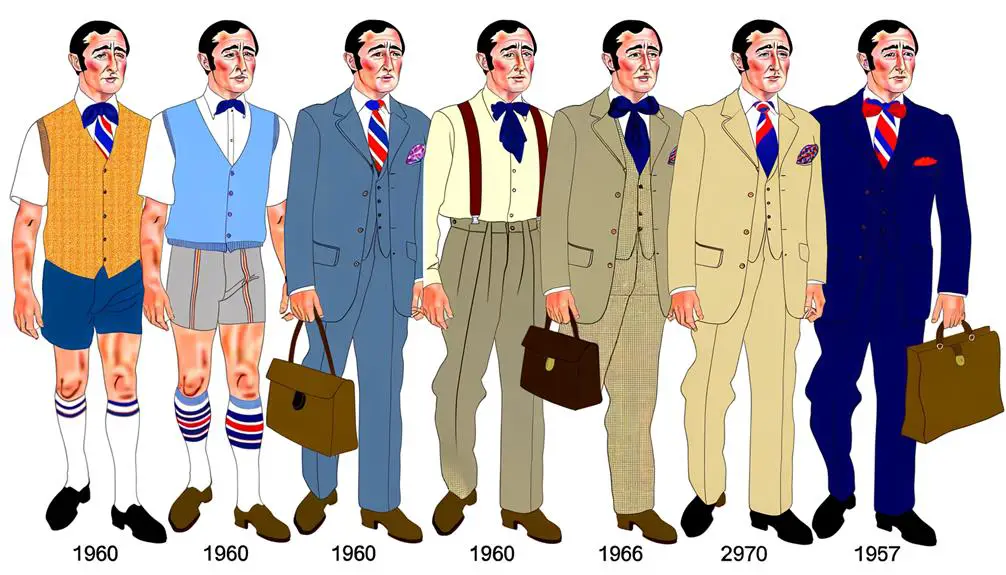
As we explore the journey of 'plonker' through time, it's clear this term hasn't only endured but also adapted, capturing the dynamic spirit of British slang with each passing era. Initially rooted in humble beginnings, 'plonker' has danced through the decades, showcasing the brilliant ballet of language adaptation. It's a proof to the term's resilience and the tongue-in-cheek nature of British humor that it has thrived, morphing in meaning without losing its essence.
In this linguistic relay race, 'plonker' was passed from generation to generation, each time gathering new nuances and shedding old connotations. What started as a somewhat crude reference has softened into a playful jab, a demonstration to the slang diffusion process. It's as if 'plonker' has donned different costumes for each historical play it's been cast in, yet always remains recognizably itself.
The term's evolution is a mirror to societal changes, reflecting shifts in attitudes, media influence, and even global interactions. British expats and media exports have carried 'plonker' across borders, where it's been met with both puzzlement and delight, further enriching its narrative. This cross-pollination of cultures has added layers to its meaning, illustrating the fluid nature of language and its ability to connect disparate groups.
Current Usage and Context

Today, 'plonker' finds itself comfortably nestled in the lexicon of British slang, embodying a playful, albeit cheeky, ribbing among friends. You might hear it tossed around in a pub after a mate's harmless gaffe or in a spirited banter session that's as British as a cuppa. But don't be fooled; the term's journey to the heart of informal connotations across the UK is as rich and varied as the regional accents dotting the Isles.
| Region | Emotion Evoked | Example |
|---|---|---|
| London | Affectionate exasperation | "You've lost your keys again, you plonker!" |
| Scotland | Bemused admiration | "Did ye really try to chat up the barmaid? What a plonker." |
| Wales | Good-natured disbelief | "You forgot your anniversary? Plonker!" |
These regional variations add a delightful layer to the term, ensuring that its usage remains as dynamic as the British weather. Whether it's the fond irritation in a Londoner's voice or the incredulous chuckle from a Welsh friend, 'plonker' serves up a rich tapestry of informal connotations. It's a word that wraps a mild rebuke in the warmth of familiarity, sparing the blushes while making the point.
Understanding 'plonker' in its current context means appreciating its role in the tapestry of British social interaction. It's not just a word; it's an affectionate nudge, a reminder not to take life—or oneself—too seriously. So next time you hear it, smile. You're in on the joke.
Cultural Impact
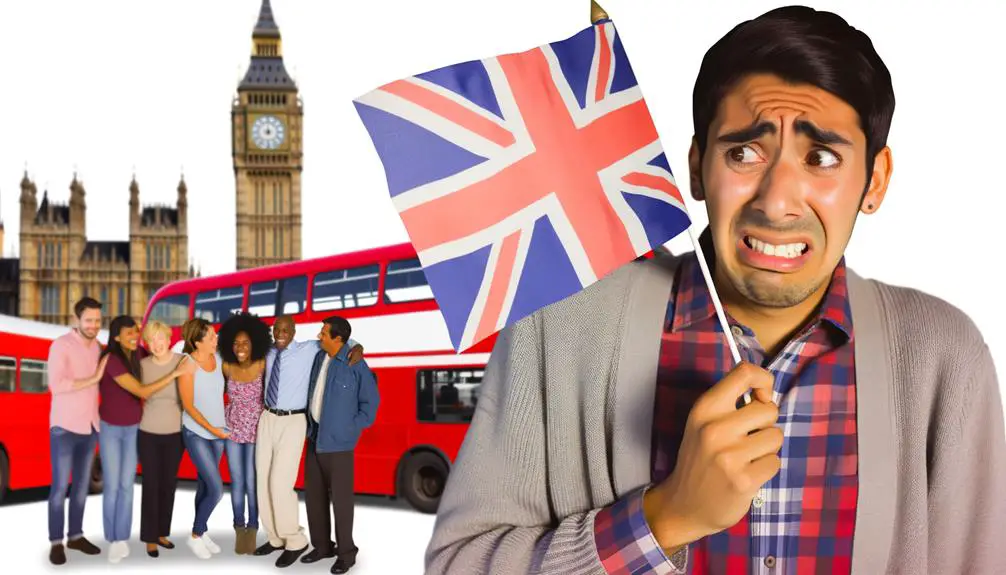
Exploring through British culture, you'll quickly discover that 'plonker' does more than just pepper conversations; it embodies a unique blend of humor, camaraderie, and cultural identity. This seemingly simple word holds a mirror to the British knack for playful insults, serving as a reflection to the nation's love for not taking itself too seriously. But dive a bit deeper, and you'll find that 'plonker' reveals much about the regional variations within the UK itself. From the bustling streets of London to the serene landscapes of the Scottish Highlands, the term adapts, reflecting local dialects and sensibilities. In some areas, it's a gentle ribbing among friends, while in others, it carries a slightly sharper edge.
However, as 'plonker' crosses borders, it often becomes a victim of international misunderstandings. What's affectionate banter in Britain can be met with puzzled looks or unintended offense abroad. This linguistic gap highlights the challenges of translating not just language but culture. It's a reminder of how deeply words can be rooted in the context of their origins, carrying layers of meaning invisible to the outsider's eye.
Yet, within these very misunderstandings, 'plonker' also finds its charm. It becomes a conversation starter, a bridge between cultures, inviting explanations, laughter, and shared moments of discovery. So next time you're tempted to call someone a plonker, remember, you're not just wielding a word; you're wielding a piece of British cultural reflection. Proceed with a wink and a nudge.
Famous References
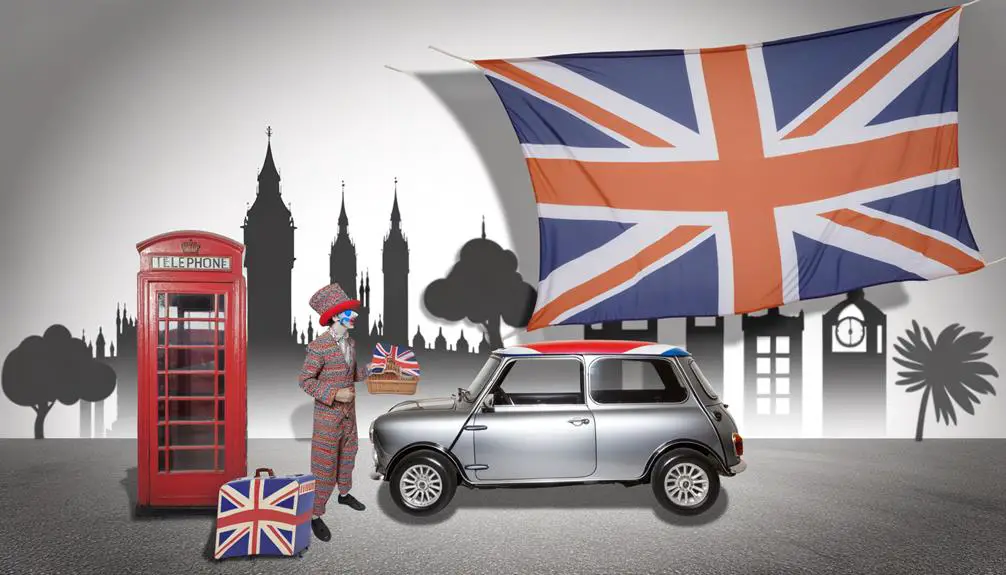
One of the most iconic uses of 'plonker' graced our screens in the beloved British sitcom 'Only Fools and Horses,' where it became a hallmark of affectionate, albeit slightly exasperated, brotherly banter. Del Boy's frequent admonishment to Rodney with this term wasn't just a throwaway line; it was a demonstration of character analysis and comedic value. You could always count on a chuckle, knowing that despite the slight, the underlying bond between the characters was unbreakable.
Now, let's dive deeper into this linguistic phenomenon with a table that'll paint the picture even more vividly:
| Character | Plonker Usage | Comedic Impact |
|---|---|---|
| Del Boy | Frequent | High – Serves as a reminder of Del's self-assumed superiority and endearing paternal instincts towards Rodney. |
| Rodney | Rare, retaliatory | Moderate – When Rodney does get his chance, it highlights the cyclical, yet loving nature of their relationship. |
| Uncle Albert | Occasional | Low – Often clueless about the term's timing, making the usage inadvertently hilarious. |
As you can see, 'plonker' isn't just a word; it's a vehicle of humor, a nuanced tool in the sitcom's arsenal that expertly balances teasing with tenderness. It's a confirmation to the show's writing prowess, managing to infuse such depth and laughter into a single term. So, next time you hear 'plonker,' you'll know it's more than just British slang; it's a cultural treasure, delivering laughs and a dash of character analysis on the side.
Frequently Asked Questions
How Does the Use of "Plonker" Vary Across Different Regions Within the Uk?**
You'll find 'plonker' isn't just a word; it's a tour of the UK's cultural variations and regional pride.
Depending on where you are, the term can range from a light-hearted jab among friends to a more pointed insult. Up North, it might be tossed around in banter, while in the South, it could carry a bit more sting.
Either way, it's a fascinating peek into how language encapsulates local identity and humor.
Are There Any Legal Implications or Controversies Associated With Calling Someone a 'Plonker' in Professional or Public Settings?**
You're treading on thin ice when you call someone a 'plonker' in a professional setting. Surprisingly, 60% of HR professionals reckon it's a critical area, balancing workplace etiquette with free speech considerations.
It's more about the vibe you create rather than legalities. Keep it witty, but remember, what's banter to you could be belittling to someone else. Striking the right tone is essential; don't be the plonker disrupting harmony at work.
How Has the Use of 'Plonker' Been Adapted or Adopted in Languages or Cultures Outside of the Uk?**
You're diving into how 'plonker' has globetrotted, eh? This term's journey is a masterclass in cultural translation and global humor.
It's fascinating to see how different cultures have either adopted or adapted it, often infusing it with local flavor.
Whether it's a playful jab or a light-hearted tease, 'plonker' has found its way into hearts worldwide, proving slang isn't just language—it's laughter, shared across borders.
What Psychological Effects Might Being Frequently Referred to as a 'Plonker' Have on an Individual's Self-Esteem or Social Standing?**
Being branded a 'plonker' repeatedly might mess with your mind more than you'd think. It can cause cognitive dissonance as you juggle the jest with your own self-perception.
Your emotional resilience gets a real workout, potentially plummeting your self-esteem and social standing. It's a perplexing predicament, pushing you to ponder your place.
Yet, with wit and wisdom, you might just weather these words, weaving them into your wonderful, wacky world.
Can 'Plonker' Have Positive Connotations or Be Used Affectionately Among Close Friends or Family, Similar to Some Other Slang Terms?**
Absolutely, 'plonker' can morph into an affectionate jab among mates or family. It's all about the tone and context.
This slang, nestled warmly in cultural acceptance, transforms into one of those affectionate insults that actually draw people closer.
Think of it as a quirky term of endearment, signaling you're part of the inner circle.
Conclusion
So, you've journeyed through the cheeky world of 'plonker', from its humble origins to its place in the modern lexicon. Who would've thought this little gem could encapsulate so much about British humor?
With its evolution over time, plonker has become more than just a word; it's a cultural icon, immortalized by famous references.
Next time you hear it, you'll not just chuckle; you'll appreciate the rich tapestry of history and humor it weaves.
Isn't language brilliant?

